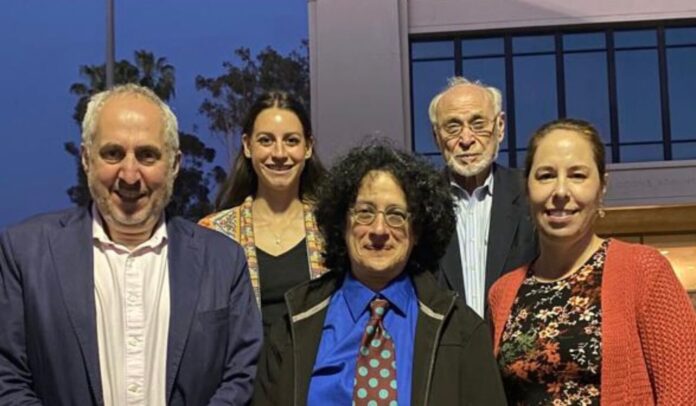
Occidental College wrapped up its celebrations of United Nations (UN) Week April 7 with a suite of programming and special events sponsored by the Kahane United Nations Program that started April 4.
Each year, Occidental’s UN Program offers seniors the opportunity in their fall semester to intern at the UN in New York, working with agencies, government offices or non-governmental organizations to experience the inner workings of diplomacy and the UN first-hand. The program also consists of two classes — one in conflict, peace and security and another on human rights. According to Cynthia Rothschild, the new faculty director of the Kahane Program, UN Week serves as a way for the Diplomacy & World Affairs (DWA) department to showcase its flagship program and to give its alumni a space to highlight their experiences.
This year, Spokesperson for UN Secretary-General António Guterres, Stephane Dujarric, gave the event’s keynote address. Dujarric said he worked as the UN’s tactical communications director, responding to emerging controversies and reacting to the major stories of the day.
“I’m responsible for the day-to-day media, [the] interaction between the Secretary-General and the journalists,” Dujarric said. “It’s really about the day-to-day work of the organization, the day-to-day work of the Secretary-General and just commenting on what is going on in the world.”
As UN Week’s major speaker, Dujarric delivered his address Monday night, titled “Everything You Wanted to Know about the United Nations in the Midst of Global Crises.” Dujarric took the day off from his responsibilities at the UN — including the daily press briefing — to be at Occidental. Dujarric joked he might not have a job when he returned to New York; still, he said, after years of meeting Occidental students at the UN, he wanted to return the visit.
“I’m here because I’ve been speaking to the students of the UN program at Occidental for the past 8 or 10 years,” Dujarric said. “I think Occidental has by far the most effective and the most in-depth program for undergraduates to intern at the UN. I mean, there’s really no school that has a program that comes close to it.”
The theme of this year’s UN Week was “Rights at Risk.” For Rothschild and Jacques Fomerand, assistant director of the Kahane UN Program, 2022 has marked a high point in global threats to human rights and the programming was designed to reflect this reality.
“We go through cycles,” Fomerand said. “I remember from when I first started getting involved into academic thinking, there was a massive onslaught on multilateralism, and what the UN was doing in the field of development and particularly human rights. We’re certainly at a point where, indeed, the number of attacks from all kinds of sites is alarming.”
The challenges today are stark, Fomerand said. But Rothschild said that part of the goal of the programming was to think about these issues in a constructive, forward-looking way.
“One of the things that feels important to me in the program, and in being new to the program, is showing a sense of possibility, and showing a sense of positive trajectory,” Rothschild said.
In line with this vision, Rothschild said she would argue that UN Week actually started the week before, with a disability advocacy and human rights panel held March 31. The talk, featuring the Senior Legal Adviser to the Special Rapporteur on the Rights of Persons with Disabilities at the UN Will Pons, helped bring forward the work of advocates and organizers that have positively shaped global policy with and alongside the UN.
“If we use the example of disability-related advocacy, that to me was so important to highlight,” said Rothschild. “[it’s] a global movement that is thoughtful, courageous, strategic, bold, and there’s an undeniable trajectory in that advocacy. I feel like we exposed students to important ideas about the UN — but probably equally important is we were able to introduce people who are doing really interesting work, either within the UN system or alongside it.”
Rothschild and Fomerand said they hoped that Dujarric would help bridge the gap between the official UN body and the advocates who carry out its vision on the ground.
“What I think Stephane Dujarric was trying to convey to us was that what happens in the UN is the beginning of a process toward the achievement of [a] project,” Fomerand said. “You have the norm that has been fabricated in a UN headquarters: what happens next? That’s where civil society and individuals, all kinds of actors, get together and try to put some flesh around that bone [that] was created in the convention.”
Dujarric said he also understands the importance of activists —particularly those of the younger generations — in holding the UN accountable and in pushing the organization in a positive direction.
“I hope that younger people are as inspired by the ideals of the organization and what it can do when it works well as their predecessors were, when they first joined the UN in 1945 and 1946,” Dujarric said. “The UN is a living and breathing organism, and it needs to be nurtured. And it needs to have people who are dedicated, who are idealistic while remaining realistic, working for it.”
Rothschild did not want UN Week to simply be a celebration of the UN’s accomplishments; she recognized that the organization is a work in progress. By acknowledging its shortcomings, however, a better organization might be possible, Rothschild said.
“At the program and at UN Week, we are not meant to blindly sell the United Nations,” Rothschild said. “The program and UN Week are meant to provide spaces to explore issues, to value thinking and to look to the arms of the UN as spaces of possibility.”
![]()






























